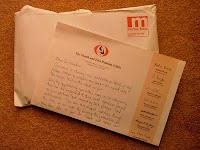The envelope was plain white with a red postage logo hinting at a bulk mailing. But nothing could have prepared me for what I saw when I opened it. This wasn't contemporary direct mail, it was a marketing Sutton Hoo.
 Inside was a letter, an order form and eight Christmas cards with envelopes. Each card had a different hand-painted design.
Inside was a letter, an order form and eight Christmas cards with envelopes. Each card had a different hand-painted design."Dear Sir/Madam", read the letter. "Christmas is drawing near and I write on behalf of my fellow artists to introduce our work - all created with the brush held in the mouth or feet".
It went on to say "Only by approaching you in this way can we adequately describe the background of these cards."
"Our aim is to support ourselves through the sale of our cards."
"The price for the set is £6.95... You are of course under no obligation to buy or return the set".
And that's where the letter is wrong. Those cards don't have a value of £6.95. They have a value of nothing. Sod all. I've been sent them without asking for them. If I don't want them, I can keep them anyway. Therefore they have no value.
Which is how I knew this strange little package had travelled through time. I reckon it would have worked fifty years ago. But not today.
Buying these cards supports talented artists. But you can't really use the cards, not now. Not here in 2010. What if your friends think you didn't pay for them? Of course you wouldn't do a thing like that, but... And what about the supposed £6.95 value? What's a £6.95 pack of cards worth when one in ten packs is wasted because the recipient doesn't want them? What if it's nine out of ten packs thrown away (or used without payment)? If you receive one, are you helping support the artists or are you getting one of those free cards that were too good for the sender to throw away?
Yes, I know, I know, there are undoubtedly economic reasons for the Mouth and Foot Painting Artists partnership doing things this way instead of just sending an order form or asking for unwanted cards to be returned. But, as I've said before, I neither want unnecessary gifts nor charitable blackmail. And, as the 21st century progresses, I'd like to think those marketing techniques will go the way of the dinosaurs.
I wish those artists every success. But I wish they'd drag their marketing out of the 1950s.
